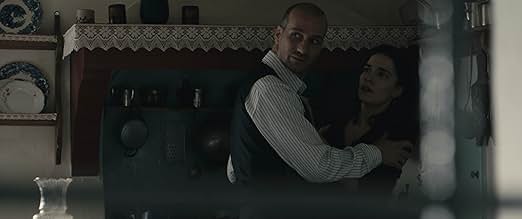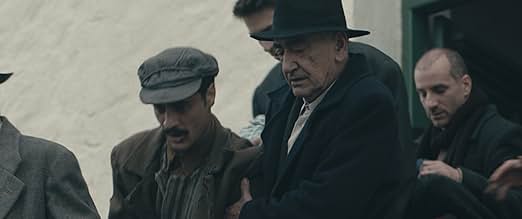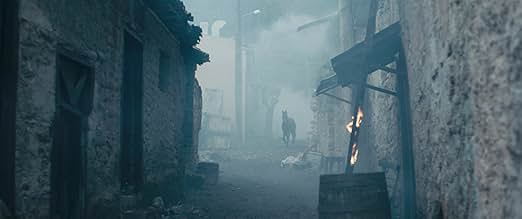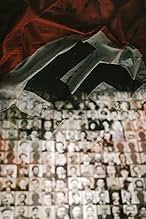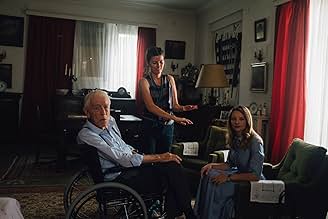AVALIAÇÃO DA IMDb
6,4/10
1,5 mil
SUA AVALIAÇÃO
Inspirado na história real do Massacre de Kalavryta, quando uma aldeia grega foi invadida pelas tropas nazistas em 1943.Inspirado na história real do Massacre de Kalavryta, quando uma aldeia grega foi invadida pelas tropas nazistas em 1943.Inspirado na história real do Massacre de Kalavryta, quando uma aldeia grega foi invadida pelas tropas nazistas em 1943.
- Direção
- Roteirista
- Artistas
- Prêmios
- 1 vitória e 5 indicações no total
Danae Skiadi
- Maria Andreou
- (as Danai Skiadi)
Kristian Wanzl Nekrasov
- Joseph von Saub
- (as Kristian Nekrasov)
Avaliações em destaque
Shot through a lens that strives for solemnity but occasionally slips into melodrama, the movie walks the fraught line between historical reckoning and national trauma with a stylistic sincerity that often succeeds, but sometimes buckles under the weight of its own ambitions. The film tackles the Kalavryta massacre-a harrowing episode of Nazi retaliation in occupied Greece-within the established grammar of the World War II civilian subgenre, a domain typically occupied by works like Come and See (1985) or The Ninth Day (Der neunte Tag, 2004), though it lacks the same unrelenting visceral control of the former or the tight theological claustrophobia of the latter. Nonetheless, this movie makes a committed, if uneven, attempt to interpret a micro-historical event with national resonance and moral complexity.
Cinematically, the film's visual language is rooted in a palette of washed-out earth tones punctuated by sharp contrasts during key scenes of violence or despair, suggesting a stylistic lineage with European war dramas of the 2000s that leaned into a kind of subdued, painterly realism. There is a clear influence of post-2000s digital austerity here, where handheld camera work does not function merely for immediacy but for a kind of subjective, almost disoriented recollection. The rural topography of Kalavryta is filmed with a reverence that borders on elegy-long static shots of mountain ridges, winding paths through olive groves, empty churches-which, while thematically coherent, sometimes stall the pacing. Unlike Lore (2012), which uses the German countryside to mirror a protagonist's interior crumbling, this film maintains a clear spatial opposition between the serenity of nature and the brutality of human action, never letting one bleed convincingly into the other.
The sound design is functional but rarely ambitious. The score leans toward the mournful and elegiac, a predictably minor key piano that emerges like clockwork before scenes of trauma or solemnity. It serves its purpose but rarely transcends it. There's a moment late in the film where silence is employed in the face of horror-arguably one of the most effective choices, precisely because it breaks from the otherwise heavily guided emotional cues the audience is subjected to.
Where the film makes one of its strongest impressions is in its casting and performances. The ensemble is handled with admirable restraint, with even the youngest actors delivering moments of remarkable gravity. The German officers are not reduced to one-dimensional villains, and yet the film avoids falling into the revisionist trap of moral relativism; instead, it adopts a tone of tragic inevitability. However, it's hard to overlook the dissonance introduced by the inclusion of a fictional modern subplot involving a German auditor and an elderly Greek survivor. These sequences, clearly devised to provide an international frame or moral arc, too often feel disconnected from the core narrative. Worse still, their insertion into the timeline-particularly the early mention of casualty numbers before the massacre is shown-undermines the dramatic progression. It's a jarring editorial decision that weakens the build-up and emotional rhythm.
From a historical vantage, the film's production context is as telling as its content. Shot and released in the early 2020s, it reflects not only a growing Greek cinematic engagement with unresolved national wounds, but also the broader European trend of revisiting World War II crimes through the lens of civilian suffering and intergenerational trauma. Unlike war films made during the Cold War or immediately post-WWII, which often adhered to clear ideological binaries or overt national mythmaking, this movie is the product of a Europe reckoning with its complicities, silences, and failures of remembrance. Still, the narrative structure-framed partially by a modern perspective looking back-clearly reflects a post-memory discourse, though not as sharply self-reflexive as The Reader (2008) or Phoenix (2014). There's a cautious moral didacticism underpinning the narrative, but it is softened by an attempt at catharsis, which some viewers may interpret as too conciliatory given the historical atrocity at its center.
Technically, editing is competent though occasionally heavy-handed in flashback transitions. The decision to intercut present-day scenes with historical reenactments helps underline the theme of memory transmission, but at times the balance skews toward the contemporary at the expense of immersion in the historical moment. This dilutes the affective potential of the massacre depiction, especially when compared to the overwhelming, nearly real-time chronology employed in Katyn (2007), where the final act's unbearable accumulation of horror is built through methodical pacing and editorial control.
Most critically, the depiction of the massacre itself-arguably the film's ethical and narrative fulcrum-suffers from both a lack of scale and emotional weight. While the camera focuses intently on individual faces in a presumably intimate approach, the absence of a broader spatial staging limits the sense of collective suffering. The viewer never truly feels the presence of over 696 victims. The use of tight framing appears to mask production limitations-too few extras, minimal staging-and results in a scene that ends abruptly, with only a few bursts of machine-gun fire and no sustained chaos or cries. The massacre's aftermath, likewise, is overly subdued. No surviving villagers are portrayed; the fact that thirteen men survived is left unmentioned, flattening the full historical texture of the event.
The treatment of the women and children, sequestered in the schoolhouse, also falls short. Historically, around 1,300 were locked inside; here, the number feels dramatically minimized. Their fear, claustrophobia, and eventual release are shown through overly individualized close-ups, instead of giving space to a communal or ritualized expression of dread and relief. The moment they discover the fate of their husbands and sons is presented with a kind of hollow theatricality, lacking the pacing and scale needed to capture the weight of collective grief. In that sense, the film could have benefitted from studying Angelopoulos' mastery of processional composition, or the raw immediacy of Elem Klimov's staging techniques.
Several historical omissions further complicate the film's credibility. The destruction of the Monastery of Agia Lavra-a symbolic and spiritual blow in the same region-is never depicted, despite its proximity and relevance. The German soldiers themselves are portrayed with superficiality; their accents unconvincing, their behavior generic. Films like The Counterfeiters (2007) managed to evoke bureaucratic evil with chilling restraint, whereas here the antagonists are little more than anonymous uniforms. These choices reflect a larger discomfort with ambiguity, a reluctance to let the full horror of the event breathe on screen.
Despite these shortcomings, the film avoids the aestheticization of suffering-a pitfall in many war dramas-and instead opts for a rawness that, while sometimes bordering on unrefined, maintains ethical integrity. The choice to rely heavily on non-verbal storytelling in key moments-close-ups of weathered faces, hands gripping crucifixes, glances exchanged between townspeople before the executions-speaks to an understanding of visual narrative power that doesn't require linguistic explanation. It's here that the film achieves its most resonant moments, when it allows silence, gesture, and gaze to convey the unbearable weight of the historical record.
This is not a perfect film, nor an innovative one in terms of cinematic form, but it is earnest and grounded. Its contribution lies in the specificity of its focus: a single Greek village, a single atrocity, and the ripples it casts across decades. That narrow scope is its greatest strength, and also its most dangerous limitation-it assumes a level of pre-existing historical knowledge from the audience that may not always be present. But for viewers steeped in the cinematic languages of WWII's lesser-known civilian traumas, it offers a somber, if uneven, meditation on the violence that festers in collective memory long after the uniforms have been folded and the guns lowered.
Cinematically, the film's visual language is rooted in a palette of washed-out earth tones punctuated by sharp contrasts during key scenes of violence or despair, suggesting a stylistic lineage with European war dramas of the 2000s that leaned into a kind of subdued, painterly realism. There is a clear influence of post-2000s digital austerity here, where handheld camera work does not function merely for immediacy but for a kind of subjective, almost disoriented recollection. The rural topography of Kalavryta is filmed with a reverence that borders on elegy-long static shots of mountain ridges, winding paths through olive groves, empty churches-which, while thematically coherent, sometimes stall the pacing. Unlike Lore (2012), which uses the German countryside to mirror a protagonist's interior crumbling, this film maintains a clear spatial opposition between the serenity of nature and the brutality of human action, never letting one bleed convincingly into the other.
The sound design is functional but rarely ambitious. The score leans toward the mournful and elegiac, a predictably minor key piano that emerges like clockwork before scenes of trauma or solemnity. It serves its purpose but rarely transcends it. There's a moment late in the film where silence is employed in the face of horror-arguably one of the most effective choices, precisely because it breaks from the otherwise heavily guided emotional cues the audience is subjected to.
Where the film makes one of its strongest impressions is in its casting and performances. The ensemble is handled with admirable restraint, with even the youngest actors delivering moments of remarkable gravity. The German officers are not reduced to one-dimensional villains, and yet the film avoids falling into the revisionist trap of moral relativism; instead, it adopts a tone of tragic inevitability. However, it's hard to overlook the dissonance introduced by the inclusion of a fictional modern subplot involving a German auditor and an elderly Greek survivor. These sequences, clearly devised to provide an international frame or moral arc, too often feel disconnected from the core narrative. Worse still, their insertion into the timeline-particularly the early mention of casualty numbers before the massacre is shown-undermines the dramatic progression. It's a jarring editorial decision that weakens the build-up and emotional rhythm.
From a historical vantage, the film's production context is as telling as its content. Shot and released in the early 2020s, it reflects not only a growing Greek cinematic engagement with unresolved national wounds, but also the broader European trend of revisiting World War II crimes through the lens of civilian suffering and intergenerational trauma. Unlike war films made during the Cold War or immediately post-WWII, which often adhered to clear ideological binaries or overt national mythmaking, this movie is the product of a Europe reckoning with its complicities, silences, and failures of remembrance. Still, the narrative structure-framed partially by a modern perspective looking back-clearly reflects a post-memory discourse, though not as sharply self-reflexive as The Reader (2008) or Phoenix (2014). There's a cautious moral didacticism underpinning the narrative, but it is softened by an attempt at catharsis, which some viewers may interpret as too conciliatory given the historical atrocity at its center.
Technically, editing is competent though occasionally heavy-handed in flashback transitions. The decision to intercut present-day scenes with historical reenactments helps underline the theme of memory transmission, but at times the balance skews toward the contemporary at the expense of immersion in the historical moment. This dilutes the affective potential of the massacre depiction, especially when compared to the overwhelming, nearly real-time chronology employed in Katyn (2007), where the final act's unbearable accumulation of horror is built through methodical pacing and editorial control.
Most critically, the depiction of the massacre itself-arguably the film's ethical and narrative fulcrum-suffers from both a lack of scale and emotional weight. While the camera focuses intently on individual faces in a presumably intimate approach, the absence of a broader spatial staging limits the sense of collective suffering. The viewer never truly feels the presence of over 696 victims. The use of tight framing appears to mask production limitations-too few extras, minimal staging-and results in a scene that ends abruptly, with only a few bursts of machine-gun fire and no sustained chaos or cries. The massacre's aftermath, likewise, is overly subdued. No surviving villagers are portrayed; the fact that thirteen men survived is left unmentioned, flattening the full historical texture of the event.
The treatment of the women and children, sequestered in the schoolhouse, also falls short. Historically, around 1,300 were locked inside; here, the number feels dramatically minimized. Their fear, claustrophobia, and eventual release are shown through overly individualized close-ups, instead of giving space to a communal or ritualized expression of dread and relief. The moment they discover the fate of their husbands and sons is presented with a kind of hollow theatricality, lacking the pacing and scale needed to capture the weight of collective grief. In that sense, the film could have benefitted from studying Angelopoulos' mastery of processional composition, or the raw immediacy of Elem Klimov's staging techniques.
Several historical omissions further complicate the film's credibility. The destruction of the Monastery of Agia Lavra-a symbolic and spiritual blow in the same region-is never depicted, despite its proximity and relevance. The German soldiers themselves are portrayed with superficiality; their accents unconvincing, their behavior generic. Films like The Counterfeiters (2007) managed to evoke bureaucratic evil with chilling restraint, whereas here the antagonists are little more than anonymous uniforms. These choices reflect a larger discomfort with ambiguity, a reluctance to let the full horror of the event breathe on screen.
Despite these shortcomings, the film avoids the aestheticization of suffering-a pitfall in many war dramas-and instead opts for a rawness that, while sometimes bordering on unrefined, maintains ethical integrity. The choice to rely heavily on non-verbal storytelling in key moments-close-ups of weathered faces, hands gripping crucifixes, glances exchanged between townspeople before the executions-speaks to an understanding of visual narrative power that doesn't require linguistic explanation. It's here that the film achieves its most resonant moments, when it allows silence, gesture, and gaze to convey the unbearable weight of the historical record.
This is not a perfect film, nor an innovative one in terms of cinematic form, but it is earnest and grounded. Its contribution lies in the specificity of its focus: a single Greek village, a single atrocity, and the ripples it casts across decades. That narrow scope is its greatest strength, and also its most dangerous limitation-it assumes a level of pre-existing historical knowledge from the audience that may not always be present. But for viewers steeped in the cinematic languages of WWII's lesser-known civilian traumas, it offers a somber, if uneven, meditation on the violence that festers in collective memory long after the uniforms have been folded and the guns lowered.
I find the film to be a strong 7.5 stars for its subject matter and scale. The acting can be uneven at times and the present appears hacked to death in the editing room (the much-publicized scene with Richard Chamberlain and Max von Sydow is nowhere to be found) resulting in a film that feels wobbly at times as it moves between past and present. One almost suspects that there was something far more elaborate in the mind of the creators especially when it comes to the present time. The writer has hinted as much in an article. That being said, one can only be judged by the result on the screen and despite its flaws, this is a good, anti-war film (a theme so topical and urgent these days) that uncovers a part of WW2 history few people outside Greece know. It's certainly worth watching.
Great movie showing the struggle of that region during that time. Very sad moments throughout but also a great depiction what people were feeling. Loved the directing and acting and would definitely recommend to is movie to anyone wanting to learn more about that region and time period.
Max von Sydow's character with the German auditor was fictitious and distracting to the main story with cut-scenes placed in the incorrect sequence (i.e., showing Max saying "500 (inaccurate) men were executed with machine guns" before showing the actual scene, while cutting the previous sequence of the men and boys walking up the hill; breaking the scene's tension). Clearly Max was brought in to bring the film some visibility to an international audience; however, if the Greeks had actually filmed the story correctly, it would have been able to stand on its own at any international film festival and audience. The machine gun massacre was very weak and did not depict the horror and nightmare of over 696 (actual number) men and boys being killed to show the inhumanity of what the Germans did to the Greeks of Kalavryta. The cinematographer only focused on a few faces in very tight shot sequences in order to hide the fact that they did not bring in enough extras for the film (a big mistake). After a few rounds of the machine gun firing, the scene was essentially over, with no cries of anguish. In actuality, many more priests and boys were killed than shown in the movie, and the full scale was not shown for the audience to immerse in the severity of the situation. The small scale of the number of women and girls locked inside the school during the film sequences was blatantly wrong, given that there were actually 1,300 in total! Additionally, the women's reaction to finding their husbands was also weak with inauthentic drama (too many close ups and not enough sequences showing the scale and anticipation of them going up the hill from the village). 13 actually survived the massacre, but none of the survivors were shown! The German soldiers were not authentic enough, nor were their 'accents'. In the credits, it states that "the massacre was...one of the worst crimes committed against a Christian population during WW2", however, they did not show the Germans burning of the Monastery of Agia Lavra, which is in the same region (5 km from Kalavryta)!
Spielberg's "Schindler's List" and "Saving Private Ryan", in addition to Klimov's "Come and See" properly display the horrors of war on the soldiers, Jews, and Russians, and the sense of realism and 'bone-chilling' dread throw a clear gut punch to those trying to emulate a deeper sense of reality and understand history's message. Director, Dimitropoulos, and cinematographer, Rahmatoulin, of "Echoes of the Past" failed to capture a fraction of the real harrowing story of the atrocities witnessed and experienced by the Greeks. Fundamentally, if only the production team had studied Klimov's (or even Angelopoulos') cinematic techniques of camera positioning and scene framing, they would have been a little closer to a true Greek film capturing the essence of a proper period piece. Clearly, the team behind this film failed to do their fallen countrymen justice by striving, instead, to create a modern "made for TV" drama! Consequently, and regrettably, this film will not stand the test of time.
*NOTE: As a Greek, I have actually visited the town of Kalavryta, the Monastery of Agia Lavra, and the sites surrounding the massacre.
Spielberg's "Schindler's List" and "Saving Private Ryan", in addition to Klimov's "Come and See" properly display the horrors of war on the soldiers, Jews, and Russians, and the sense of realism and 'bone-chilling' dread throw a clear gut punch to those trying to emulate a deeper sense of reality and understand history's message. Director, Dimitropoulos, and cinematographer, Rahmatoulin, of "Echoes of the Past" failed to capture a fraction of the real harrowing story of the atrocities witnessed and experienced by the Greeks. Fundamentally, if only the production team had studied Klimov's (or even Angelopoulos') cinematic techniques of camera positioning and scene framing, they would have been a little closer to a true Greek film capturing the essence of a proper period piece. Clearly, the team behind this film failed to do their fallen countrymen justice by striving, instead, to create a modern "made for TV" drama! Consequently, and regrettably, this film will not stand the test of time.
*NOTE: As a Greek, I have actually visited the town of Kalavryta, the Monastery of Agia Lavra, and the sites surrounding the massacre.
It is the first time in Greek filmography that we don't see the struggle of any social/political group of people ( like Greek Communists or Jews) during the war.
This movie is not about minorities, or even the Greeks themself. It is about War Crime and how much our lives matter as human beings.
It is a historic narative action about the Execution of almost the entire population of a village in Greece. So no spoilers ahead, just have in mind history facts.
Directing (9/10) I would prefer less Close up shots, but they where handled properly. The way the director represented the execution of all males of the village is just a piece of art. And the aftermath was so painfull to see that honestly I felt some tears dropping. I would consider a (7/10) but there were some really memorable shots that they stay with me even after a week!
Screenplay (6.5/10) Overall not bad, although it was slow at some periods and there were some silly issues as far as realism is concerned. Simple story, not bad, but I felt it could be told much sooner than it was.
Acting (8/10) Ok, you have a legend, Max von Sydow, some French and some Greek actors. If you exclude Max, all the other actors were pretty decent. Not extraordinary, but did the job much better than "Ok". Yet, at some moments they gave soul and spirit.
Cinematography (10/10) Seriouly, exceptional. Honestly, I haven't seen many movies, even in Hollywood these days with that quality in the photography! The Colours are in the right mood, the picture is crispy and raw, the lighting gives drama when needed, the aesthetics are memorable.
Sound (9/10) Clear conversations, great sound effects, pure emotion at some shots. Nothing to be complex or disturbing.
Overall (8.5/10) I thought about it a lot. If I was not Greek I would still like this movie for all the above reasons. Maybe I wouldn't care about the Script so much, but still I would enjoy it.
I have a feeling this movie will have average rating because there is a problem with the Greeks as population.
The Greeks hate whatever is Greek, most propably because they compare multi billionaire productions with local Athenian artists. I hope I'm wrong, but history always repeats itself so...
This movie is not about minorities, or even the Greeks themself. It is about War Crime and how much our lives matter as human beings.
It is a historic narative action about the Execution of almost the entire population of a village in Greece. So no spoilers ahead, just have in mind history facts.
Directing (9/10) I would prefer less Close up shots, but they where handled properly. The way the director represented the execution of all males of the village is just a piece of art. And the aftermath was so painfull to see that honestly I felt some tears dropping. I would consider a (7/10) but there were some really memorable shots that they stay with me even after a week!
Screenplay (6.5/10) Overall not bad, although it was slow at some periods and there were some silly issues as far as realism is concerned. Simple story, not bad, but I felt it could be told much sooner than it was.
Acting (8/10) Ok, you have a legend, Max von Sydow, some French and some Greek actors. If you exclude Max, all the other actors were pretty decent. Not extraordinary, but did the job much better than "Ok". Yet, at some moments they gave soul and spirit.
Cinematography (10/10) Seriouly, exceptional. Honestly, I haven't seen many movies, even in Hollywood these days with that quality in the photography! The Colours are in the right mood, the picture is crispy and raw, the lighting gives drama when needed, the aesthetics are memorable.
Sound (9/10) Clear conversations, great sound effects, pure emotion at some shots. Nothing to be complex or disturbing.
Overall (8.5/10) I thought about it a lot. If I was not Greek I would still like this movie for all the above reasons. Maybe I wouldn't care about the Script so much, but still I would enjoy it.
I have a feeling this movie will have average rating because there is a problem with the Greeks as population.
The Greeks hate whatever is Greek, most propably because they compare multi billionaire productions with local Athenian artists. I hope I'm wrong, but history always repeats itself so...
Você sabia?
- CuriosidadesMax Von Sydow's final film role.
Principais escolhas
Faça login para avaliar e ver a lista de recomendações personalizadas
- How long is Echoes of the Past?Fornecido pela Alexa
Detalhes
- Data de lançamento
- País de origem
- Centrais de atendimento oficiais
- Idiomas
- Também conhecido como
- Echoes of the Past
- Locações de filme
- Empresas de produção
- Consulte mais créditos da empresa na IMDbPro
- Tempo de duração
- 1 h 39 min(99 min)
- Cor
Contribua para esta página
Sugerir uma alteração ou adicionar conteúdo ausente


